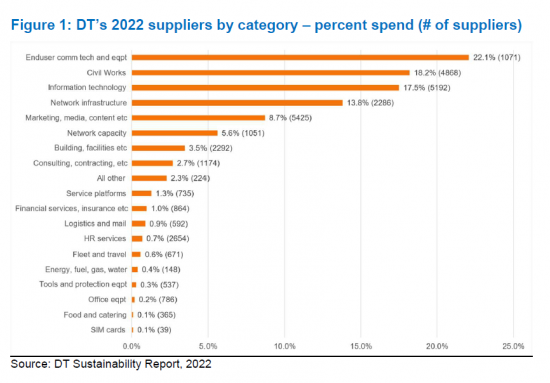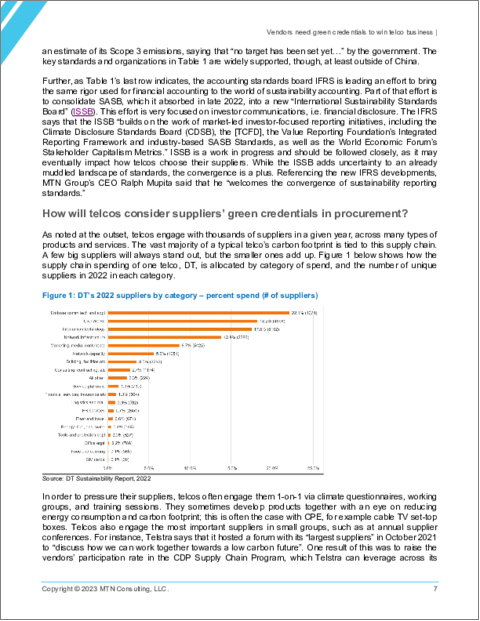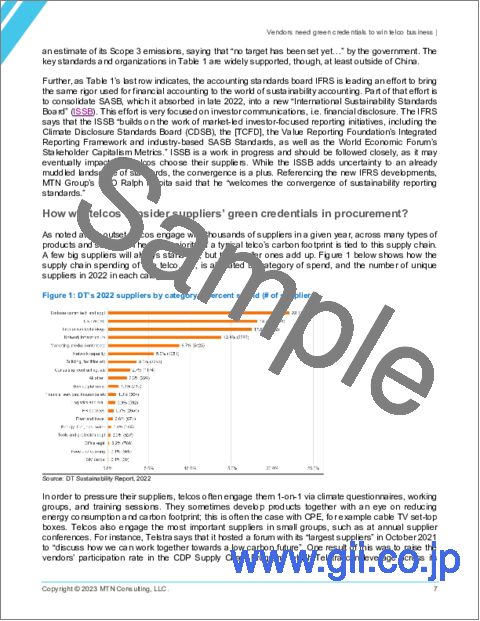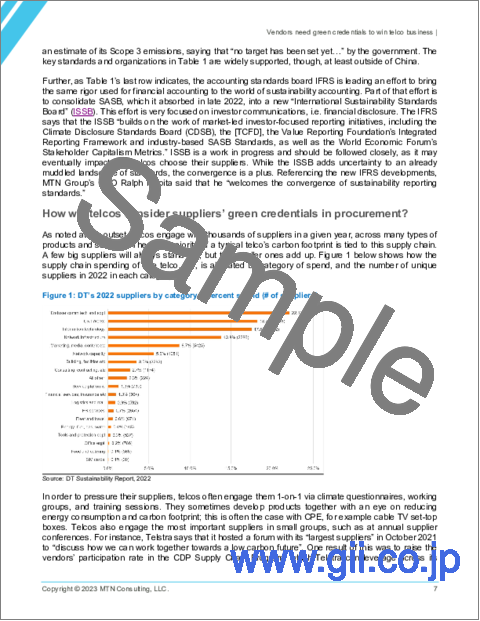|
|
市場調査レポート
商品コード
1274856
ベンダーは通信事業者を獲得するためにグリーン認証を必要としている:通信事業者は気候変動への迅速な対応と排出量削減をベンダーに促すため、企業独自のプレッシャーツールと業界標準を組み合わせて使用するVendors Need Green Credentials to Win Telco Business: Telcos Use a Mix of Company-specific Pressure Tools and Industry Standards to Entice Vendors to Act Faster on Climate Change and Reduce Emissions |
||||||
|
|||||||
| ベンダーは通信事業者を獲得するためにグリーン認証を必要としている:通信事業者は気候変動への迅速な対応と排出量削減をベンダーに促すため、企業独自のプレッシャーツールと業界標準を組み合わせて使用する |
|
出版日: 2023年05月11日
発行: MTN Consulting, LLC
ページ情報: 英文 10 Pages
納期: 即納可能
|
- 全表示
- 概要
- 図表
- 目次
当レポートでは、通信事業者の調達について調査分析し、通信事業者がどのように対外支出の環境への配慮を追跡し、ベンダーの環境認証を重視しているかを考察しています。
ビジュアル

範囲
対象企業
|
|
目次
- サマリー
- ベンダーは通信事業者を獲得するためにグリーン認証を必要としている
- レポーティングフレームワークはまだ進化している
- 通信会社には数千のサプライヤーがいるが、スコープ3の排出量は技術ベンダーが推進している
- 通信会社は気候変動の脅威を認識し、サプライヤーと対応
- 気候変動に対する行動を促進している主な組織と基準
- 通信会社は調達においてサプライヤーのグリーン認証をどのように考慮するか
- ベンダーは何をすべきか
- 付録
List of Tables and Figures
- Table 1: Key organizations in sustainability reporting
- Figure 1: DT's 2022 suppliers by category - percent spend (# of suppliers)
This brief report addresses telco procurement in the context of the rising importance of environmental sustainability. It discusses how telcos are tracking the greenness of their external spend and placing more importance on vendors' environmental credentials. Telcos increasingly focus on suppliers' compliance with the Science-Based Targets initiative (SBTi), audits conducted by the Joint Alliance for CSR (JAC), environmental ratings from EcoVadis, participation in the CDP Supply Chain Program, and emissions data compliant with the GHG Protocol.
VISUALS

A typical big telco has thousands of suppliers, across hundreds of categories of products and services. DT had >25,000 in 2022, for instance, while the much smaller Singtel still had well over 5,000. When telcos assess their carbon footprint, the vast majority come from this supply chain; Scope 3 (indirect, value chain) greenhouse gas emissions are usually 70-90% or more of total emissions; 77% for Telenor, and 85% for Deutsche Telekom, for instance. The primary driver of telcos' Scope 3 footprint is "purchased goods and services", in particular purchased technology. That means telcos need to push on the supply chain if they want to reduce their carbon footprint. They are starting to do so. Much of the pressure is informal, through working groups and on-site collaborations. Most telcos have their own company-specific processes and rules related to green procurement; these guide the oversight process in many regions. But telcos are increasingly relying on hard numbers vetted by third parties to guide their procurement. Telcos are focused on how many of their suppliers (1) have approved climate change plans with the SBTi; (2) use the CDP Supply Chain program's system for reporting data; (3) have been audited under the Joint Alliance for CSR; and, (4) have EcoVadis sustainability assessments. The new IFRS creation, the International Sustainability Standards Board, will likely gain importance as it evolves. There are other relevant groups and standards, and they can vary regionally, especially in the US, China, Japan, and the EU. Vendors who aggressively implement credible climate change action plans, and report rapidly declining GHG emissions, will have an advantage in winning telco business in the future.
COVERAGE:
Companies mentioned:
|
|
Table of Contents
- Summary
- Vendors need green credentials to win telco business
- Reporting frameworks are still evolving
- Telcos have 1000s of suppliers but tech vendors drive Scope 3 emissions
- Telcos recognize climate change threat, addressing with suppliers
- Key organizations and standards facilitating action on climate change
- How will telcos consider suppliers' green credentials in procurement?
- What should vendors do?
- Appendix





